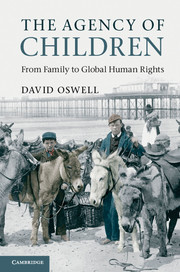Book contents
4 - Partial and situated agency
Published online by Cambridge University Press: 05 April 2013
Summary
In the context of this broad framing of structure and agency, sociologies of children and childhood have also looked to different ways of understanding agency in terms of social interaction. Social interaction is understood within empirical contexts and inasmuch as the features of that interaction emerge only within that empirical context. Social interaction is broadly conceived as situational. In this chapter I discuss four analytical models concerned with peer cultures, social competence, hegemonic negotiation and tactical agency. All the writers I consider focus on social interaction; but social interaction is framed, whether explicitly or implicitly, within a broader, more fixed and less dynamic sense of children’s position and relation to social structure.
Peer cultures
Research which has paid attention to children’s cultural interactions has, in many ways, been more attentive to the patterning of children’s collective associations. Ethnography, but also conversation analysis, discourse analysis and other forms of qualitative method, it has been argued, allow children’s social experience to be made visible and ‘allows children a more direct voice and participation in the production of sociological data’ (James and Prout, 1990: 8–9). These spaces of association, these collective worlds of children (worlds produced by children, through their social agency), are, to use the terms of Habermas, more akin to ‘lifeworld’ than ‘system’. But they are also cultures inasmuch as these worlds are ways of life.
- Type
- Chapter
- Information
- The Agency of ChildrenFrom Family to Global Human Rights, pp. 51 - 61Publisher: Cambridge University PressPrint publication year: 2012



